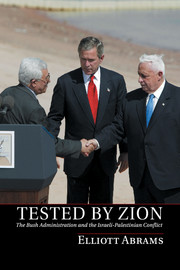Book contents
- Frontmatter
- Contents
- Acknowledgments
- Introduction
- 1 Early Days
- 2 9/11 and the Search for a Policy
- 3 Roadmap to Disengagement
- 4 “New Realities on the Ground”
- 5 Arafat, Disengagement, Sharon
- 6 Olmert – Peace or War?
- 7 War in Lebanon – and Condi
- 8 From Mecca to Annapolis
- 9 The “Meeting” at Annapolis
- 10 Two Trips to Jerusalem
- 11 Final Days in Gaza and Turtle Bay
- 12 Lessons Learned
- 13 Conclusion
- Index
- References
13 - Conclusion
Published online by Cambridge University Press: 05 January 2013
- Frontmatter
- Contents
- Acknowledgments
- Introduction
- 1 Early Days
- 2 9/11 and the Search for a Policy
- 3 Roadmap to Disengagement
- 4 “New Realities on the Ground”
- 5 Arafat, Disengagement, Sharon
- 6 Olmert – Peace or War?
- 7 War in Lebanon – and Condi
- 8 From Mecca to Annapolis
- 9 The “Meeting” at Annapolis
- 10 Two Trips to Jerusalem
- 11 Final Days in Gaza and Turtle Bay
- 12 Lessons Learned
- 13 Conclusion
- Index
- References
Summary
Will there ever be peace between Israelis and Palestinians, or is there still (as the story I told in the introduction suggests) hope but no chance?
More than a century of violence between Israelis and Arabs in the area once called Mandatory Palestine has finally produced a broad consensus that two entities should exist there – Israel and Palestine. At least since the Arab or Saudi Plan of 2002, Arab states appear to have given up hope of destroying Israel. The PLO leadership has long since sought a deal with Israel that would lead to its withdrawal from the West Bank and to the creation of a Palestinian state. And since the days of Ariel Sharon's leadership, most of the Israeli right has joined the center and left in believing that Israel should separate from the Palestinians and allow them to rule themselves in their own entity.
Yet progress since the Oslo Agreement of 1991 has been very slow. This is generally viewed as a great problem, but I am inclined to see it as both inevitable and salutary. In the Oslo Agreement, Israel took a defeated and exiled Yasser Arafat and placed him back in the West Bank at the top of Palestinian politics. This was quite similar to the disastrous British decision to appoint Haj Amin al Husseini as Mufti of Jerusalem in 1921, which also elevated a terrorist and poisoned Palestinian political life for a generation. Both decisions were avoidable errors, and both led to years of violence and many Jewish and Arab deaths. For like Husseini, Arafat saw the murder of Jews as a reasonable tactic to achieve his goals. And as in the case of Husseini, the “Palestinian self-rule” that was one of Arafat’s key goals meant not that the people would rule themselves but that he himself would rule them.
- Type
- Chapter
- Information
- Tested by ZionThe Bush Administration and the Israeli-Palestinian Conflict, pp. 314 - 320Publisher: Cambridge University PressPrint publication year: 2013



